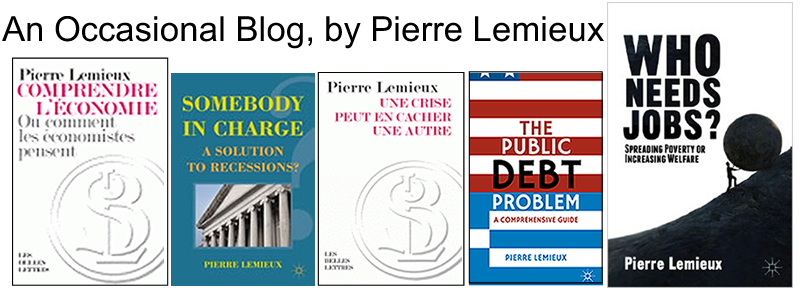Presidential inaugurations are, at best, similar to royal marriages in England, where simple people dream of the Prince Charming; at worst, they resemble nationalist orgies where people proclaim their faith in, and submission to, their dear leader. There was both in Barack Obama’s inauguration today. Continue reading
Category Archives: Blog posts
James Buchanan (1919-2013)
Published in the Financial Post (www.nationalpost.com), January 10, 2013 [Note that the copy editor mistakenly removed the quote marks around “politics without romance,” which is an Buchanan’s expression.]
If one expression can capture the work of James Buchanan, who died yesterday aged 93, it is “politics without romance.” His approach generated a whole school of economic analysis called “Public Choice.” Closely associated to Buchanan were Gordon Tullock, Richard Wagner, Geoffrey Brennan, and other economists working mainly at the Virginia Polytechnic Institute and, later, George Mason University.
For his work in this field, Buchanan won the 1986 Nobel Prize in Economic Sciences.
Buchanan’s starting point was so simple enough that it now seems rather obvious. Continue reading
The Price of Gold
At the end of November, Goldman Sachs predicted a short-term (over a three-month horizon) increase in the price of gold, followed by a downward trend through 2014. Accompanied by a new, bullish outlook for the American economy, this bearish forecast for gold made the financial news (see for example the Financial Times of December 7, 2012). Since then, the price of gold has been trending downwards, but things could change.
This sort of forecast raises interesting questions on the factors that influence the price of the yellow metal. Continue reading
Beyond Madoff ’s Wildest Dreams
That’s how American politicians and bureaucrats are dreaming. In the current issue of Regulation, see my review of Laurence J. Kotlikoff and Scott Burns, The Clash of Generations (MIT Press, 2012).
My book on the same topic, The Public Debt Problem: A Comprehensive Guide (Palgrave Macmillan, 2013) will be out in a few days.
How China Became Capitalist
See my review of Ronald Coase and Ning Wang’s recent book in the current issue of Regulation.
The NRA Proposal
[Revised version: The original version of this post contained an error in the calculation of the budget required by the NRA proposal.]
The National Rifle Association’s proposal to put a policeman in every school is not bad given the circumstances. Refusing to protect children with armed force when necessary in the vain hope to “de-escalate violence“, as an activist puts it, is tragically naïve. Let the madmen and children killers de-escalate violence first!
The NRA’s statement contains words of wisdom about which one wonders why it is apparently so revolting to so many people:
But what if, when Adam Lanza started shooting his way into Sandy Hook Elementary School last Friday, he had been confronted by qualified, armed security?
Will you at least admit it’s possible [emphasis in original] that 26 innocent lives might have been spared? Is that so abhorrent to you that you would rather continue to risk the alternative?
“Members of Congress”, the NRA statement also points out, “work in offices surrounded by Capitol Police officers”.
The NRA’s statement, however, is not above criticism. Continue reading
Plato and Public Health
See my article (in French) on Plato and public health, published yesterday in Le Devoir (Montréal). I have reproduced it on my legacy website.
The Rise of the Young Mass Killer
The Sandy Hook shooting raises issues that are often forgotten by both the pro-gun and the anti-gun side.
The first issue, ignored by the pro-gun side, is that the availability of guns does, other things being equal, increase the potential damage that madmen can do. A spate of knife attacks on schoolchildren in China has been recently observed, but with fewer deaths than for gun attacks in Scotland, Norway, or America. Continue reading
Deutsche Bank’s Sense of Justice
As the rule of law declined in parallel with growing government intervention over the past few decades, Leviathan acquired the habit of threatening large companies, especially those who depend most on their reputation capital, with fines and judicial proceedings, counting that they will pay quickly and obediently in order to get the bureaucrats off their back. As Willie Sutton explained when asked why he robbed banks, “that’s where the money is”. Continue reading
Voting Under Influence
Suppose I were a pundit who could influence the vote of 500,000 Americans. There would then be a reasonable probability that I would be decisive in tomorrow’s election, that is, that my actions—my recommendation, in this case—would carry the election. Whom would I recommend that my readers vote for? Continue reading
